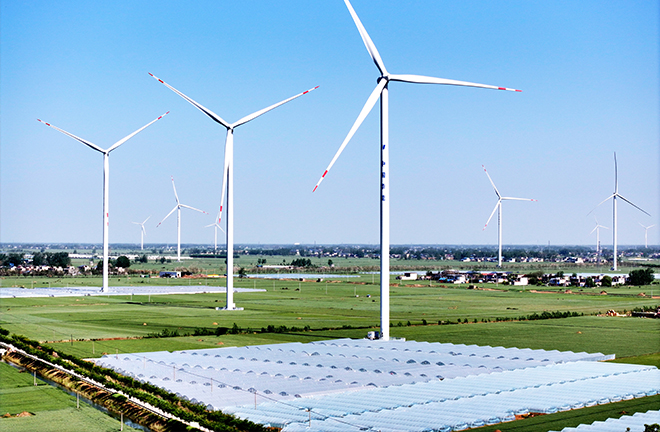Symposium eyes Xi Jinping Thought on Eco-Civilization

A cluster of wind turbines stands tall over agricultural fields in Bozhou, Anhui Province, as seen on April 25. Photo: IC PHOTO
On June 9, the Chinese Academy of Social Sciences (CASS) convened a symposium on Xi Jinping Thought on Eco-Civilization in Beijing.
As the latest achievement in adapting Marxist thought on the human–nature relationship to China’s historical context and contemporary realities, Xi Jinping Thought on Eco-Civilization constitutes a vital component of Xi Jinping Thought on Socialism with Chinese Characteristics for a New Era.
According to Zhang Yongsheng, director of the Research Institute for Eco-Civilization (RIECO) at CASS, the thought creatively integrates Marxist views on humanity’s relationship with nature with both the concrete practices of ecological governance in China and the ecological wisdom embedded in the nation’s traditional culture. It has taken shape as a system of 10 tenets, or “10 firm commitments,” encompassing overall Party leadership over ecological conservation; the principle that when the natural environment thrives, civilization thrives too; harmony between humanity and nature; the view that lucid waters and lush mountains are invaluable assets; the notion that nothing is of more universal benefit to the wellbeing of the people than a fine natural environment; the view that green development constitutes a transformative shift in development philosophy; the belief that mountains, rivers, forests, fields, lakes, and grasslands form a biotic community; implementing the strongest laws under the strictest system to protect the natural environment; having the whole public take part in building a beautiful China; and working together to build a global ecological civilization.
This system, Zhang explained, retains Marxism’s theoretical grounding while reflecting the ecological sensibilities of Chinese civilization, marking a new stage in the Party’s scientific understanding of ecological and environmental governance and the principles of sustainable development.
Xi Jinping Thought on Eco-Civilization is not only a rigorously structured theoretical system but also an open and inclusive intellectual framework, said Tian Chunxiu, deputy director of the Research Center for Xi Jinping Thought on Eco-Civilization. Drawing from Marxist philosophy, Marxist political economy, and scientific socialism, it spans a wide range of disciplines and provides comprehensive guidance across sectors—including the economy, politics, rule of law, science and technology, culture, livelihoods, society, ecological conservation, and national security.
Zhang Zhiqiang, director of the Institute of Philosophy at CASS, pointed out the deep theoretical resonance between Xi Jinping Thought on Eco-Civilization and China’s traditional ecological philosophy. Featuring ideas such as Tianren Heyi—the unity of humanity and nature—and the principle of “utilizing natural resources with restraint,” traditional culture offers rich intellectual nourishment for today’s ecological efforts. Moreover, Xi’s assertion that “when the natural environment thrives, civilization thrives too” extends the Marxist theory of civilization and instills an ecological dimension into the building of a leading country in culture.
Ecological conservation and high-quality economic development are dialectically unified, noted Xiao Xinjian, a research fellow at the Research Center for Xi Jinping Thought on Economy. The principle that “lucid waters and lush mountains are invaluable assets” challenges outdated notions that pit environmental protection against development. Instead, by cultivating ecological industries and advancing green technologies, China is translating ecological value into economic gains and generating momentum for its new development paradigm.
Zhou Zhanhua, director of the Institute for the Rule of Law at the China Law Society, remarked that Xi Jinping Thought on the Rule of Law provides the legal guarantee for building an ecological civilization. China has accelerated the enactment and revision of legislation pertaining to the ecological environment, establishing mechanisms such as ecological compensation and environmental public interest litigation. These efforts represent the practical logic of “safeguarding lucid waters and lush mountains through rule of law.”
Gou Haibo, vice president of the China Institute of International Studies, underscored the international significance of China’s ecological vision. Initiatives such as building “a community of life for humanity and nature” and “a human community with a shared future” demonstrate China’s commitment to aligning domestic ecological governance with global environmental strategies. This approach promotes the establishment of a fair, inclusive, and mutually beneficial global environmental governance system, demonstrating China’s responsibility as a major country.
The symposium was co-hosted by RIECO and the Research Center for Xi Jinping Thought on Eco-Civilization at CASS.
Edited by CHEN MIRONG

 PRINT
PRINT CLOSE
CLOSE